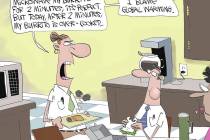EDITORIAL: Proposed party-bus regulation stifles competition
If it looks like a bus and drives like a bus, then it’s a bus. Unless, of course, the Nevada Transportation Authority soon decides that a bus can be called a limo. In the name of safety, of course, because that’s what regulations are always about. They’re never about suffocating competition.
As reported by the Review-Journal’s Richard N. Velotta on March 23 and March 30, the Transportation Authority in February published a proposed amendment addressing several aspects of bus and limousine operations. One of the passages of the proposed amendment defines vehicles equipped with “a pole or other apparatus generally used for dancing; nightclub-style lighting such as rotating lights, strobe lights or lasers; or, fog or smoke machines” as livery limousines. Backers of the new language — primarily the Livery Operators Association, an organization composed of Las Vegas’ six largest limousine, bus and taxi companies — say it’s designed to prevent unlicensed and uninsured out-of-state companies from operating in the city during large conventions and special events. Regulators say such companies are potential threats to public safety.
In addition, the proposed regulation would block charter bus companies from entering the lucrative and growing party-bus industry. The Nevada Bus and Limousine Association, formed in October with this battle in mind and representing about 25 smaller carriers, says the regulation is an effort to limit local competition by making it more difficult for smaller companies to run their party buses. The regulation would reclassify party buses as limousines — a class the Transportation Authority already has a strict cap on.
Lou Castro, NBLA vice president and owner of Earth Limos and Buses, and Tony Clark, NBLA president and the CEO and owner of 24/7 Limousines, told Mr. Velotta that for a limousine company to expand, it must prove that any business a new vehicle generates would be new and wouldn’t take business from existing companies. In other words, a new vehicle can’t provide competition — say, a better product and/or a better price. Isn’t the point of opening any business rooted in the belief that it can meet or beat its competitors?
NBLA officers say they can’t even replace old limos because those were grandfathered under prior regulations.
Reclassifying buses as limos makes those regulations even more constricting. “It’s an almost impossible standard,” Mr. Castro said. “Whatever limos we have on the road now is capped, and 99 percent of the time, we can’t increase. Plus, it’s about a two-year process, and we have to jump through a lot of hoops. By the time we’d get approved, the reason we sought the license is no longer viable or a prospective client has gone elsewhere.”
As Mr. Velotta noted, those hoops include an intervention process in which existing companies in the industry get to weigh in on any expansion proposal and dispute any justification before the Transportation Authority, which has the final say.
It’s quite apparent that, far from safety, this regulation — like others before it — was crafted to limit outside competition, whether through holding down smaller companies or keeping out-of-state businesses from entering the field. If the demand for these so-called rolling ultra-lounges is such that even a California or Arizona company can make money bringing vehicles to Las Vegas for a big weekend, it’s silly to create rules preventing said company from doing so.
To be blunt, it’s protectionist. Existing companies are using regulations to protect themselves from competition. The Transportation Authority should shoot down this proposal and replace it with a better idea: Stop using government force to stifle competition, and instead, start competing.























